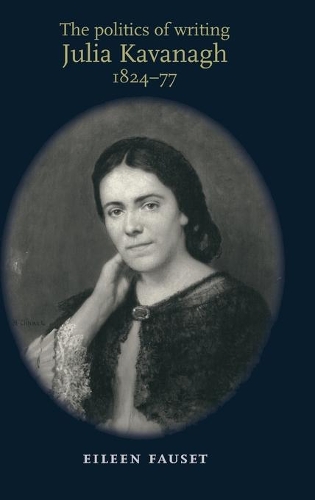
The Politics of Writing: Julia Kavanagh, 182477
(Hardback)
Available Formats
Publishing Details
The Politics of Writing: Julia Kavanagh, 182477
By (Author) Eileen Fauset
Manchester University Press
Manchester University Press
3rd March 2009
United Kingdom
Classifications
General
Non Fiction
823.8
Physical Properties
Hardback
304
Width 156mm, Height 234mm, Spine 17mm
603g
Description
Julia Kavanagh was a popular and internationally published writer of the mid-nineteenth century whose collective body of work included fiction, biography, critical studies of French and English women writers, and travel writing. In this critically engaged study Eileen Fauset sees Kavanagh as a significant but neglected writer and returns her to her proper place in the history of women's writing. With few known primary sources to go on the author manages, through her skilful selection of letters, official documents and historical commentary, to piece together some of the jigsaw of Kavanagh's life. Throughout this study, the biographical element informs and directs discussion of Kavanagh's writing itself. What emerges is a succinct and telling portrait of a woman who, through a desire to write, acquired both economic independence and a means through which she could voice her sexual politics. Eileen Fauset challenges the historical attitudes to 'popular romance', a genre read mainly by women and generally discounted as simple entertainment. She argues that in Kavanagh's novels romance is often the pivot around which issues of cultural and sexual difference are examined, a perspective that, invariably, also informed Kavanagh's non-fiction. This study addresses the current enthusiasm for the reclamation of neglected women writers and also brings to light interesting material that might otherwise have remained unknown to the specialist. It will appeal to academics, students and enthusiasts of Victorian literature and women's writing. -- .
Reviews
Fauset is to be congratulated for bringing this self-effacing writer to wider public attention at last fulfilling Bronte s wish that Kavanagh should struggle ere long into the sunshine. Rather than being relegated to the ranks of silly women novelists, Kavanagh clearly deserves scholarly attention for her contribution to literary history, and Fausets book is a significant step on the road to recognition.
Caroline Palmer, Ashmolean Museum, Oxford, UK, Gender & History, Vol. 22, No. 1, April 2010
Kavanaghs emphasis on historical romance (a genre the utopian-authoring Sharp might have frowned upon) is given strong and convincing support by analysis of the cultural, social, economic and gendered factors involved in its authorship. There is, in fact, something of the romance of the archives about Fausets study Fauset is appropriate in her praise and evident appreciation of Kavanaghs work and the potential for ideas to be read within it. But it usually remains on the right side of critical encounter. In this sense, it is the combination and complementarity of the words politics and writing in Fausets subtitle that provide the hub of her reading Fauset has done a service here in bringing forward sustained comment on Julia Kavanaghs works in this way, and as the number of facsimile productions of Kavanaghs works increases there will be a number of researchers who will benefit from leads they can follow from this text.
Mark Llewellyn, University of Strathclyde, Womens History Review
Fauset's monograph makes a persuasive case for taking a serious look at Julia Kavanagh as a writer, and not just reviewer of other, more significant writers, and its argument is particularly admirable because it covers so much unfamiliar ground in such an accessible way In addition to providing a brilliantly recuperative narrative that infuses Kavanagh's texts with biographical richness, this book also contributes to the field of nineteenth-century studies through its comprehensive bibliography of Kavanagh's publications The occasional survey feel of the book seems "right" for Fauset's overarching project, however, for it opens the door to further study of a neglected writer whose wide and varied oeuvre contains subtle and nuanced feminist subtexts that can add to our understanding of nineteenth-century gender discourses.
Julia McCord Chavez, Saint Martins University, Nineteenth-Century Prose
It is Fausets meshing of critical approaches with social history and a detailed biographical account, which makes this tome an interesting addition to many fields including Irish, Victorian, and womens studies.
Irish University Review: A Journal of Irish Studies
Author Bio
Eileen Fauset was formerly a Lecturer in English at the University of Leeds, Bretton Hall Campus and has published extensively on Irish and British womens writing
